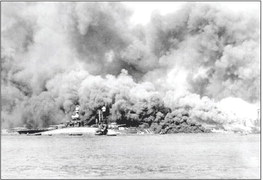Most of those lost aboard the USS Oklahoma have been ID’d


Between June and November 2015, personnel from Defense POW/MIA Accounting Agency (DPAA) exhumed the unidentified crew members from the National Memorial Cemetery of the Pacific for anthropological analysis. Of the 429 killed, 394 had been buried as unknown persons. As of Sept. 15, 346 have been identified.
The Nevada-class battleship USS Oklahoma was commissioned in 1916 and was the pride of the American fleet. The ship was notable for being the first American class of oil-burning dreadnaughts.
The vessel saw duty in World War I, protecting Allied convoys to Europe. As fate would have it, the Oklahoma was moored at Ford Island Pearl Harbor, Hawaii, on Dec. 7, 1941, the day the Japanese attacked.
During the attack, several torpedoes from Japanese airplanes hit the Oklahoma’s hull, and the ship capsized. A total of 429 crew members
died. Survivors jumped off the ship into burning, oil-coated water or crawled across mooring lines that connected the Oklahoma and the battleship USS Maryland. Some of the sailors and Marines inside escaped when rescuers drilled holes and opened hatches to rescue them. From December 1941 to June 1944, Navy personnel recovered the remains of the crew; they were interred in the Halawa and Nu’uanu cemeteries in Hawaii. In September 1947, tasked with recovering and identifying fallen U.S. personnel in the Pacific Theater, members of the Army’s American Graves Registration Service disinterred the remains of U.S. dead from the two cemeteries and transferred them to the Central Identification Laboratory at Schofield Barracks, Hawaii. At that time, the laboratory staff was only able to confirm the identifications of 35 men from the USS Oklahoma. The AGRS buried the unidentified remains in 46 plots at the National Memorial Cemetery of the Pacific, known as the Punchbowl, in Honolulu. In October 1949, a military board classified those who could not be identified as not recoverable. DPAA has been working to identify the remains since 2015 when the USS Oklahoma project began. Scientists from the Armed Forces Medical Examiner System have used mitochondrial DNA and autosomal DNA analysis.



